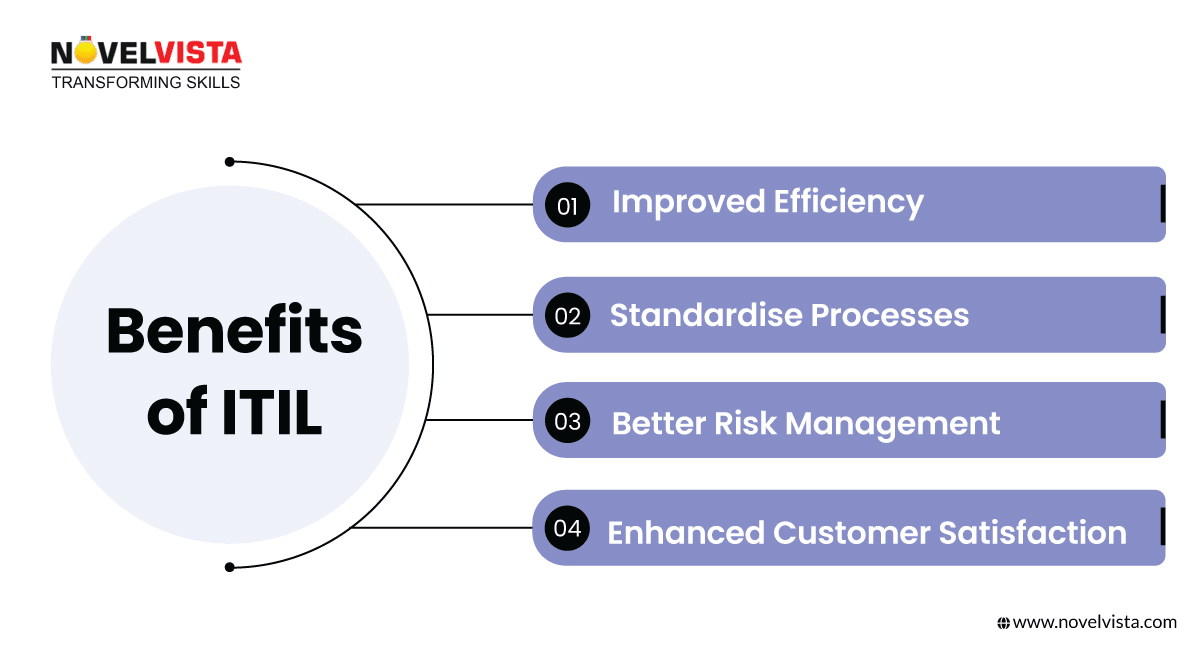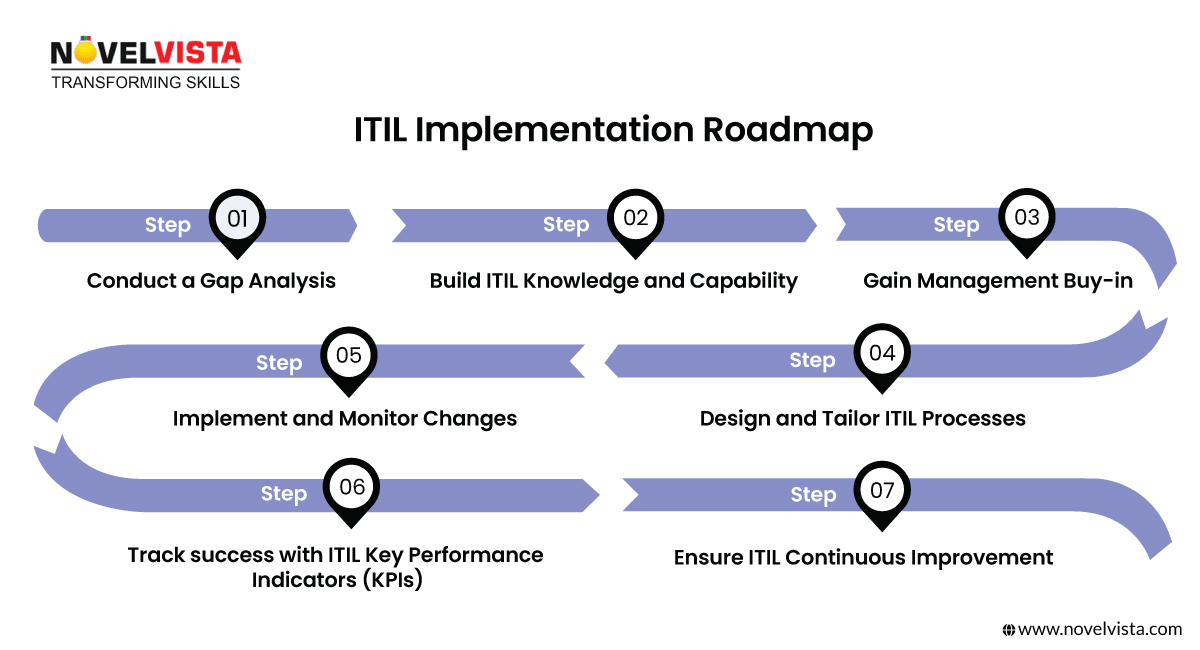1. Building Capability, Understand ITIL and go for Foundation Certification:
If you want to implement ITIL methodology in your organization or become a ITIL implementer in your current organization then first you have to understand the ITIL methodology or process and its concepts, best practices. It is always recommended to attend ITIL foundation training than only certification. As in training lot of practical examples are covered along with theory.
Training is usually delivered by industry expert trainers who have more than 20 – 25 years of experience under their belt, and they share best practices, actual case studies, real life example
2. Do a Gap analysis and Identify the quick wins (Remember 80:20 rule)
The basics of Gap analysis are the doing comparison between the actual performance and the potential or desired performance and if the actual performance is lower than desired performance cause has to be identified e.g investment, manpower, technology investment.
Pareto analysis technique is very effective here. The 80:20 rule states that 20 percent of the inputs or activities are responsible for 80 percent of the outcomes or results. By doing gap analysis and applying 80:20 rule you can find the root cause to your low performance and find fix to solve these issues.
3. Get Buy in from the management and design or tailor the processes:
A management buy is about agreeing to support something or accepting a decision(to Tailor the process) or action as something you could be a part of.
Process Tailoring:
“One Size Fits All” doesn’t always fit
As best practices for one might not be best for another, thus they have to be tailored whenever you want to implement them in different environment (organizations)
Triggers for Tailoring:
The following are some typicalexamples of process tailoring:
4. Spread awareness and communicate the change:
If you are changing/tailoring the processes or adding modifying the process then Communication plays important role. Communication would be used for creating user awareness for the changes enabling wide use and acceptance of the updated/tailored processes.
5. Implement and monitor the change:
If all the procedure mentioned above performs accurately then you have to implement the changes and monitor the performance but while monitoring you have to concentrate on the new changes you have made. Because this might be your performance enhancer or performance degrader.
6. Optimization and Improvements
After successfully achieving the desired performance Constant monitoring of process and outcome is required for to finding new improvement opportunities As Sky is the Limit.
7. Deliver Value for customer delight
By optimizing resources and processes to deliver the right product or right service to the customer by delivering Best in class solutions to provide value for customer’s investment
Remember, ITIL implementation is not a one-time activity but an ongoing journey of continual improvement. It requires commitment, dedication, and collaboration from all levels of the organization to achieve the desired outcomes and maximize the benefits of ITIL.
Understanding what ITIL is and why it matters before diving into how to implement ITIL is crucial.
The ITIL framework is a collection of globally respected IT service management and best practices. ITIL focuses on ensuring service quality, meeting business needs, and enhancing IT efficiency.

Want to gain a solid foundation in ITIL? Enrolling in the ITIL 4 Foundation Certification Training Course would be the best decision!
Following ITIL practices ensures smooth adaptation and lasting progress. Here’s what organisations should focus on:
A systematic ITIL implementation roadmap ensures the successful and seamless adoption of ITIL best practices.

STEP 1: Build ITIL Knowledge and Capability.
Start the process by understanding its core methodologies and principles. ITIL training and certification help IT professionals learn about ITIL roles and responsibilities, ITIL continuous improvement strategies, and IT service management.
STEP 2: Conduct a Gap Analysis.
Evaluate your current ITSM practices and compare them with ITIL's best practices. Identify potholes in tools, processes, or team skills to create a well-defined plan for improvements.
STEP 3: Gain Management Buy-in.
Getting the support of your leadership team is a must for a successful ITIL framework implementation. Explain the benefits of ITIL to them, such as cost efficiency, risk reduction, and improved service performance.
STEP 4: Design and Tailor ITIL Processes.
Not every ITIL process is one-size-fits-all. Customise the process to fit your organisation’s distinct needs structure and needs. Tailor it to what will work best for your team.
STEP 5: Implement and Monitor Changes.
Gradually carry out ITIL processes and tools with proper monitoring. Focus on ITIL Change Management to reduce risks caused by new implementations.
STEP 6: Track success with ITIL Key Performance Indicators (KPIs).
Using ITIL Key Performance Indicators (KPIs) helps evaluate ITIL’s impact. Key metrics include:
STEP 7: Ensure ITIL Continuous Improvement.
ITIL isn’t a one-off project—it’s an ongoing journey. ITIL's continuous improvement involves regularly evaluating performance and refining processes.
1. Challenge: Resistance to change.
2. Challenge: Lack of clear objectives.
3. Challenge: Complex IT Environment.
Case Study 1: ITIL in Healthcare
A hospital implemented ITIL best practices to improve IT support and patient record access. Results?
Case Study 2: ITIL in Banking
A financial institution introduced ITIL change management to enhance service reliability. Outcomes?
These success stories show that effective ITIL implementation delivers satisfiable business benefits.
Keeping up with ITIL trends ensures organisations stay competitive and continuously improve IT services.
Understanding how to implement ITIL is the first step in transforming IT service management. Organizations that follow a well-defined ITIL implementation roadmap and leverage ITIL best practices see higher efficiency, reduced downtime, and improved customer satisfaction.
Ready to start your ITIL journey? Get certified with the ITIL 4 Foundation Certification Training Course today with NovelVista!
Start your certification journey today and become the driving force behind real IT service transformation in your organization.
Confused about our certifications?
Let Our Advisor Guide You